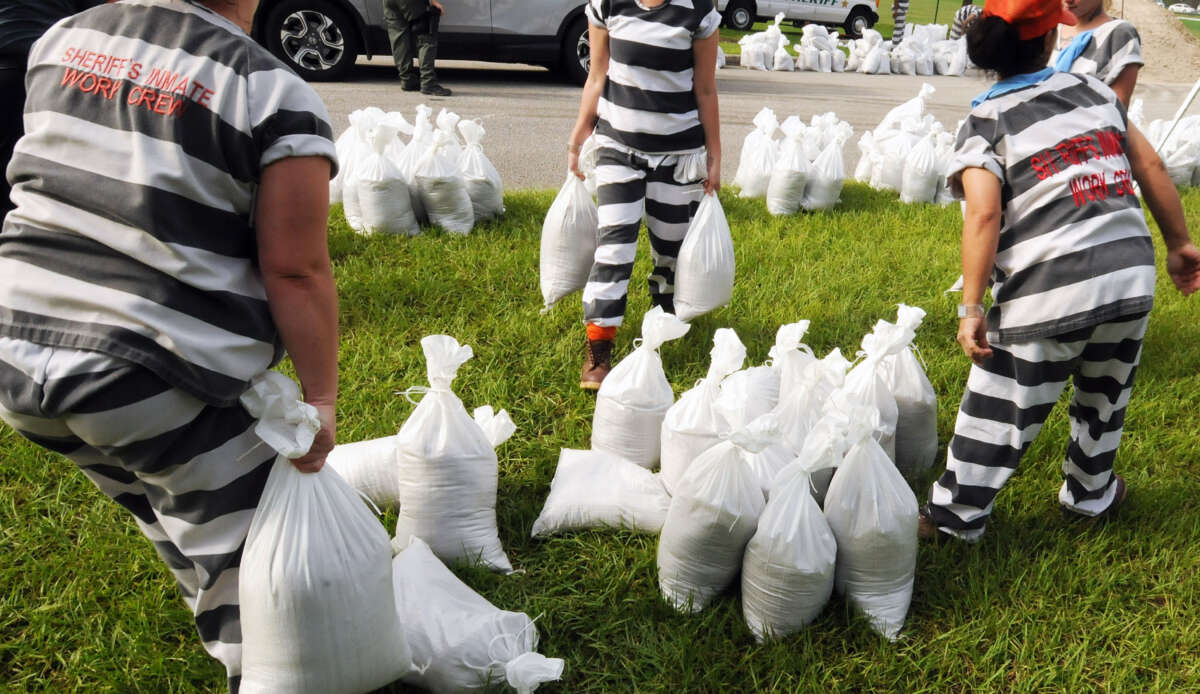Did you know that Truthout is a nonprofit and independently funded by readers like you? If you value what we do, please support our work with a donation.
A sprawling new investigation has found that forced prison labor feeds into the supply chains of a wide and dizzying range of food and grocery companies, ranging from small local brands and restaurants to major conglomerates like Tyson, Coca-Cola and Kroger.
The two-year Associated Press investigation, published Monday, found that widespread abuse of prison workers has become a multibillion dollar industry due to partnerships between prisons, corporations and lawmakers. While prisoners, often forced to work, make pennies on the dollar or sometimes no money at all while facing physical and mental abuse on the job, states, prisons and companies make tens of millions of dollars of profits.
The reporters sifted through public information requests in all 50 states and followed nearly $200 million of goods and livestock from harvest to sales from the past six years — sometimes literally following vans from yards where prisoners are working to where the goods are delivered.
Interviews with current and former prisoners revealed that they were put through horrific conditions for the sake of profits for the brands that contracted their labor or the states that imprisoned them. Prisoners, who are disproportionately Black, have died and lost limbs on the job and have been abused by the prison staff. And because they’re not considered employees under labor laws, they don’t have the same rights as workers classified as employees do to strike or form unions.
The reporters found that prison labor is part of the supply chain of companies spanning across nearly the entire food industry, including grocers like Aldi, Costco, Kroger, Target, Walmart, and Whole Foods; restaurant companies like Burger King, Chipotle, Domino’s and McDonald’s; and industry conglomerates like Cargill, Coca-Cola, General Mills, Pepsi and Tyson, which together own such a large variety of brands that they are nearly impossible to avoid in retail settings.
Even local restaurants or smaller brands that market themselves as ethical or selling a specialty food, like Eggland’s Best or Belgioioso Cheese, have received the goods, as reporters found. Hickman’s Family Farms, which supplies Eggland’s Best and Land O’Lakes, had housed 140 women in a warehouse on its property in Arizona as the COVID-19 pandemic set in in March 2020; the women made just $3 an hour after deductions, with the state taking 30 percent for “room and board.”
One inmate transport van that reporters followed stopped at a former slave plantation in St. Francisville, Louisiana, that has now been turned into a wedding venue and tourist site, where two Black men entered the site’s restaurant; one of them told reporters he washed dishes there.
“You can’t call it anything else. It’s just slavery,” Calvin Thomas, who was imprisoned for over 17 years at the Angola state penitentiary in Louisiana, told The Associated Press. Workers there are often forced to work the fields just days after arriving at the prison, which sits on a former antebellum plantation, making as much as 40 cents an hour. Thomas described how the prisoners would be forced to work through oppressive heat that would even make the guards’ horses collapse.
“Slavery has not been abolished,” Curtis Davis, who was imprisoned for over 25 years in the Louisiana State Penitentiary and who now advocates against forced prison labor, told The Associated Press. “It is still operating in present tense,” Davis continued. “Nothing has changed.”
Another worker, Faye Jacobs, told reporters that her only pay for working on Alabama prison farms was two rolls of toilet paper a week, and toothpaste and some menstrual pads each month. In Alabama, as in several other Southern states, prisoners aren’t paid anything for their work for most jobs. Even when workers are paid, the state severely garnishes their wages; in the past five years, Alabama brought in $32 million by garnishing 40 percent of its prisoners’ wages, the investigation found.
Proponents of prison labor say that they view the low cost of prison labor as a good thing. “It’s a win-win,” said Sheriff Wayne Ivey of Brevard County, Florida. “The inmate that’s doing that is learning a skill set… They are making time go by at a faster pace. The other side of the win-win is, it’s generally saving the taxpayers money.”
A terrifying moment. We appeal for your support.
In the last weeks, we have witnessed an authoritarian assault on communities in Minnesota and across the nation.
The need for truthful, grassroots reporting is urgent at this cataclysmic historical moment. Yet, Trump-aligned billionaires and other allies have taken over many legacy media outlets — the culmination of a decades-long campaign to place control of the narrative into the hands of the political right.
We refuse to let Trump’s blatant propaganda machine go unchecked. Untethered to corporate ownership or advertisers, Truthout remains fearless in our reporting and our determination to use journalism as a tool for justice.
But we need your help just to fund our basic expenses. Over 80 percent of Truthout’s funding comes from small individual donations from our community of readers, and over a third of our total budget is supported by recurring monthly donors.
Truthout’s fundraiser ends tonight! We have a goal to add 143 new monthly donors before midnight. Whether you can make a small monthly donation or a larger one-time gift, Truthout only works with your support.
